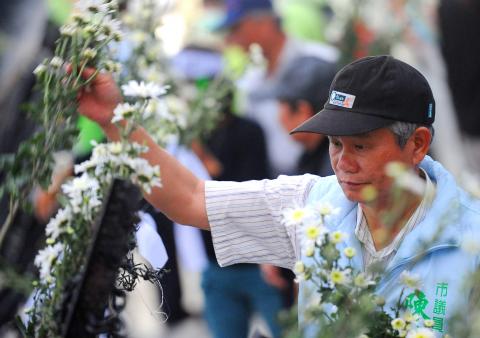Protesters yesterday threw flowers at the motorcade of Association for Relations Across the Taiwan Strait Chairman Chen Yunlin (陳雲林) in an attempt to draw attention to Beijing’s crackdown on pro-democracy activists and rights lawyers.
Instead of jasmine, which has come to symbolize the protests that have swept across north Africa and the Middle East, protesters waved and handed out white chrysanthemums because jasmine is not in season, organizers said.
The protesters also wore white headbands with the words “Respect, Jasmine, Peace” printed on them and called on China to respect human rights, democracy and the right to assembly.

Photo: Sam Yeh, AFP
A retired civil servant at the protest said that “of course” he supported pro-democratic protests in China, adding that they could pave the way for more peaceful relations with Taiwan.
“We don’t have anything against the Chinese people — it’s the government we are concerned with,” said the man, who did not give his name.
Outside E-DA World, where Chen is staying, representatives from pro-independence groups gathered together in the afternoon and sang Mo Li Hua, a popular Chinese folk song about jasmine, while waving the white flowers in the direction of the hotel.
During Chen’s first day in Taiwan on Monday, protesters including Democratic Progressive Party politicians attempted to deliver plastic flowers and a box of jasmine juice to the hotel where the Chinese delegation was staying.
Demonstrators attempted to do so again yesterday, but were quickly stopped by police.

CHAOS: Iranians took to the streets playing celebratory music after reports of Khamenei’s death on Saturday, while mourners also gathered in Tehran yesterday Iranian Supreme Leader Ayatollah Ali Khamenei was killed in a major attack on Iran launched by Israel and the US, throwing the future of the Islamic republic into doubt and raising the risk of regional instability. Iranian state television and the state-run IRNA news agency announced the 86-year-old’s death early yesterday. US President Donald Trump said it gave Iranians their “greatest chance” to “take back” their country. The announcements came after a joint US and Israeli aerial bombardment that targeted Iranian military and governmental sites. Trump said the “heavy and pinpoint bombing” would continue through the week or as long

TRUST: The KMT said it respected the US’ timing and considerations, and hoped it would continue to honor its commitments to helping Taiwan bolster its defenses and deterrence US President Donald Trump is delaying a multibillion-dollar arms sale to Taiwan to ensure his visit to Beijing is successful, a New York Times report said. The weapons sales package has stalled in the US Department of State, the report said, citing US officials it did not identify. The White House has told agencies not to push forward ahead of Trump’s meeting with Chinese President Xi Jinping (習近平), it said. The two last month held a phone call to discuss trade and geopolitical flashpoints ahead of the summit. Xi raised the Taiwan issue and urged the US to handle arms sales to

State-run CPC Corp, Taiwan (CPC, 台灣中油) yesterday said that it had confirmed on Saturday night with its liquefied natural gas (LNG) and crude oil suppliers that shipments are proceeding as scheduled and that domestic supplies remain unaffected. The CPC yesterday announced the gasoline and diesel prices will rise by NT$0.2 and NT$0.4 per liter, respectively, starting Monday, citing Middle East tensions and blizzards in the eastern United States. CPC also iterated it has been reducing the proportion of crude oil imports from the Middle East and diversifying its supply sources in the past few years in response to geopolitical risks, expanding

Pro-democracy media tycoon Jimmy Lai’s (黎智英) fraud conviction and prison sentence were yesterday overturned by a Hong Kong court, in a surprise legal decision that comes soon after Lai was jailed for 20 years on a separate national security charge. Judges Jeremy Poon (潘兆初), Anthea Pang (彭寶琴) and Derek Pang (彭偉昌) said in the judgement that they allowed the appeal from Lai, and another defendant in the case, to proceed, as a lower court judge had “erred.” “The Court of Appeal gave them leave to appeal against their conviction, allowed their appeals, quashed the convictions and set aside the sentences,” the judges